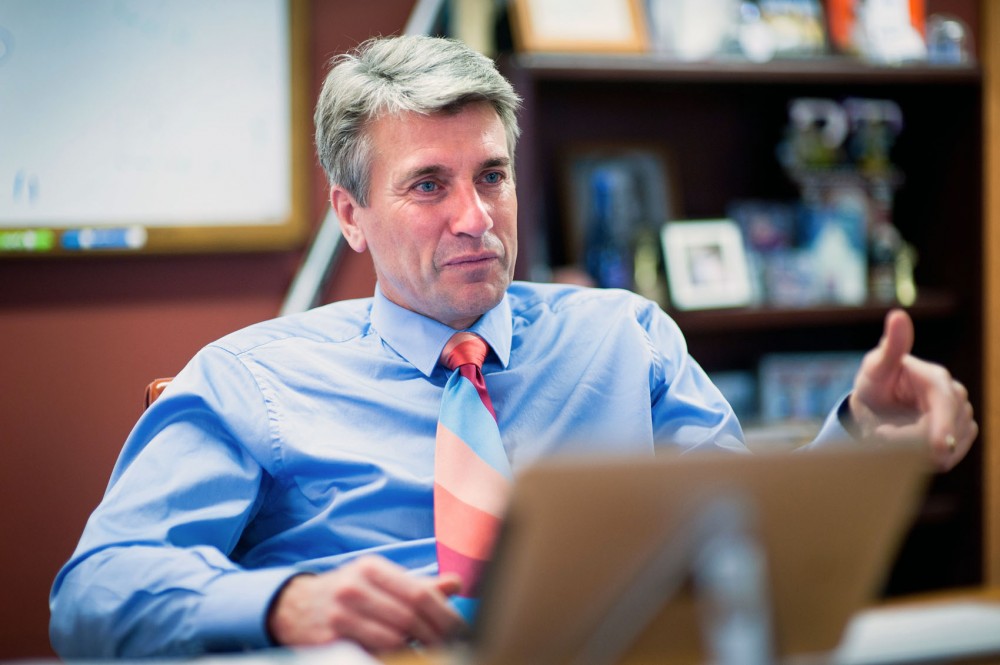R.T. Rybak will exit the mayor’s office in January, leaving behind a legacy of 12 years of leading Minneapolis.
Since he was first elected in 2001, the city has experienced policy changes ranging from budget reform to increased student engagement.
Many who watched Rybak during his time in office consider his work on the budget to be a crowning achievement.
“As far as coping with budget cuts, he did relatively well, especially if you take the 2008 economic collapse into consideration,” Hamline University law professor David Schultz said.
Ward 4 City Councilwoman Barbara Johnson agreed and said his work put the city “on really good financial footing.”
“He’s really led us in a way to hold the line on spending, and that has produced a city that came out of the recession in way, way better shape than other cities across the country,” he said.
Rybak also kept involved with students at the University of Minnesota.
Political science junior Laura Pratt, president of the University’s College Democrats, said Rybak had a strong relationship with students and the University.
“He’s been very accessible to students,” she said. “He’s on campus all the time, promoting students participating in politics and the political process.”
Rybak came to the University campus last fall for Voterpalooza and led a gun control panel at Coffman Union in February.
“He’s a household name, which I think is something that’s very unique in a mayor,” Pratt said.
The I-35W bridge collapse in 2007 is sometimes noted as the greatest crisis Rybak faced while in office.
“That was a challenging time for anyone to be in public office, and I think he was an effective leader,” said Ward 2 City Councilman Cam Gordon.
Despite Rybak’s popularity, Schultz said his career as mayor did have its shortcomings.
“In terms of gun violence and murder rates in Minneapolis and allegations of police brutality, it’s not clear how well he really did,” Schultz said. “He hasn’t fundamentally changed police culture.”
Gordon said the Vikings stadium deal is one of his biggest disappointments in the Rybak era.
“I think we’re going to have enormous debts to pay, and all of our sales taxes will be tied up in this,” he said.
Ward 6 City Councilman Robert Lilligren said Rybak will leave behind a “strong” legacy, but the stadium issue was a point of contention.
“I think he’s very proud of the Vikings stadium, but we disagreed on that deal,” he said.
Schultz said some will remember Rybak’s mayoral term as ironic.
“He first got elected after criticizing the current mayor for focusing on downtown development, and he promised to revitalize neighborhoods,” Schultz said. “But he will be most known for the Vikings Stadium and other downtown developments.”
What’s next?
Rybak announced last winter he wouldn’t seek re-election, but he will busy himself in other ways after leaving office.
“Doing this job in the way I’ve chosen to do it involves some personal sacrifices, and right now, I owe it to those around me, and to myself, to get a bit more balance in my life,” he said in a December press release.
Rybak said earlier this month he doesn’t plan to run for another political office in the near future.
“The only other thing I would ever run for is governor,” Rybak said Nov. 6. “But that would be many years down the road.”
After councilwoman and mayor-elect Betsy Hodges takes Rybak’s spot next year, he plans to teach at the University, serve as vice chair of the Democratic National Committee and do volunteer work.
He’ll also serve as the executive director of Generation Next, an organization that focuses on closing the racial achievement gap in schools and the job market.
Schultz said he thinks Rybak will run for the governorship sooner than anticipated.
“He’s positioned himself here for governor,” he said. “My guess is that he can be a commentator on the news and retain some political relevancy.”







